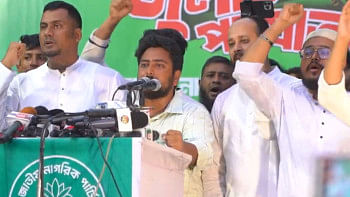The sound of Rohingya camps

The alleys of the Rohingya camps were ringing with the sound of music in the Rohingya language. A tiny Bluetooth audio kit was playing in the restaurants and could be heard even from the bamboo-fenced houses of the Rohingyas.
Many such audio kits can be found in the world's largest Rohingya camp in Kutupalong of Cox's Bazar.
The Rohingya people shared that the purpose of this sound is to raise awareness among the forcibly displaced Myanmar nationals about dowry, child marriage, violence against women and various health issues.
Twenty-one-year-old Bibi Fatima (pseudonym) shared that this audio kit plays seven days a week for five to nine hours each day.
"Women were considered voiceless in our society. Rohingya men made all the decisions, and the role of women was to only take care of family members," said Fatima, sitting in her house.
"I got married when I was only 16 years old. I was not aware of child marriage and its dangers. But Oxfam gave us knowledge on the dangers of child marriage," she added.
Oxfam started working with the Rohingya people in 2018 to create awareness on various social issues and held several awareness sessions with Rohingya women. However, that too was suspended when the Covid-19 pandemic hit the country.
"During the initial days of the pandemic, women were blamed for the spread of Covid-19.
Thankfully, that taboo was removed through the awareness campaign," shared Fatima, adding that, since then, she started playing the audio kit in her house to make people aware of the issues.
"Due to Covid-19, face-to-face sessions stopped, rumours about Covid-19 started spreading fast, and violence against women increased in the camp. So, we came up with an alternative for face-to-face sessions. We gave the audio kit to them to play from their homes," said Umme Tamima, Gender Project Assistant, Oxfam.
Oxfam distributed a total of 80 audio kits in the camp area where eight volunteers regularly play the kits.
"We made issue-based content involving the Rohingya people, all in the Rohingya language. Now, people are greatly benefitting from the audio kits," she added.
When asked how much she benefited from the audio kits, Fatima shared that, a few months ago, her parents tried to arrange a marriage for her younger sister, Bibi Kulsum (pseudonym), who was just 16 years old.
"I talked to my parents about the dangers of child marriage. I spoke with my relatives too, and I managed to convince them to stop the marriage of my younger sister. I couldn't dare to dream of doing this before," said Fatima.
Girls from her area now come to her to know about many issues, including intimate partner violence.
"We got the courage to start disseminating our knowledge. Thanks to this small audio clip that has changed the scenario," added Fatima. According to her, child marriage rates in her area have dropped down to nearly zero,
Rohingya men also walk in the alleys and main streets of the camps to make people aware by playing the audio kits through loudspeakers.
Abul Khair (pseudonym) said he does this every day from 9:00 am to 4:00 pm.
Both Fatima and Khair do this voluntarily.
When asked why he does it voluntarily, Khair said, "We do it for our own safety and security and for the betterment of our society."


 For all latest news, follow The Daily Star's Google News channel.
For all latest news, follow The Daily Star's Google News channel. 



Comments